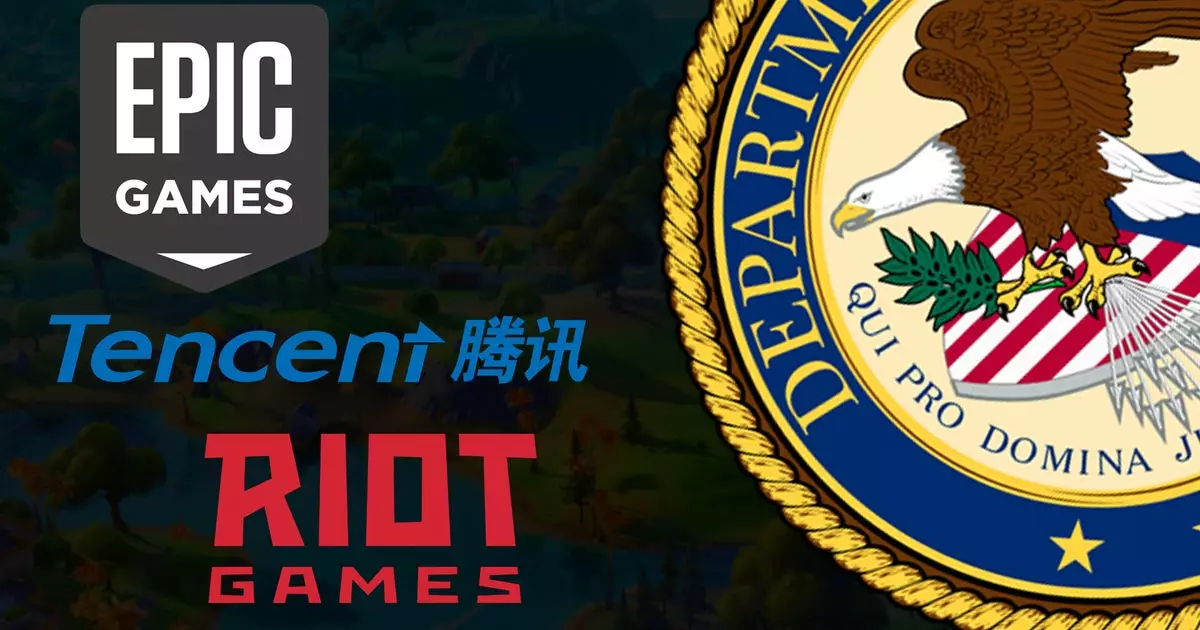The gaming industry, which has continuously evolved over the past decades, is no stranger to scrutiny over monopolistic practices and boardroom conflicts of interest. Recently, Epic Games, the well-known developer behind significant titles such as Fortnite and the Unreal Engine, has found itself in the eye of a legal storm. Following an investigation by the U.S. Department of Justice (DoJ) pertaining to potential violations of antitrust laws, two directors appointed by Tencent have opted to step down from their roles. This decision underscores the complexities of corporate governance in a landscape where competition and regulatory oversight intertwine.
Tencent, a Chinese multinational conglomerate entrenched in the gaming world, holds a minority stake in Epic Games. However, the company’s extensive portfolio also includes full ownership of Riot Games, a direct competitor to Epic in the gaming sphere. The DoJ’s investigation targeted the overlapping interests represented in the boardroom as problematic. The underlying principle of these antitrust regulations, primarily governed by the Clayton Act, seeks to eliminate any potential conflicts that could arise when individuals serve on the boards of companies competing within the same market. This act prohibits directors from holding simultaneous positions that may compromise competitive integrity.
The implications of Tencent’s dual role as both a stakeholder in Epic and a competitor through Riot Games evoke comparisons to familiar examples from various industries. For instance, had a high-ranking member of PepsiCo attended key meetings at Coca-Cola, the repercussions would be significant, illustrating the potential for insider information and improper influence.
The directors who have resigned, Ben Feder and David Wallerstein, were undoubtedly key players in their own right. Feder, previously served as the CEO of Take-Two Interactive, a major publisher associated with Tencent, and held the position of President of International Partnerships at Tencent. Wallerstein’s tenure as Senior Executive Vice President at Tencent concluded just earlier this year, establishing him as a seasoned player in this complex web of corporate interactions. Their resignations, as confirmed in an email from Epic Games to Bloomberg, reflect the need for the company to align its governance with regulatory expectations while mitigating any potential backlash from governmental inquiry.
The DoJ has emphasized that, while resignations have occurred, no admissions of liability were made by either Tencent or Epic Games, highlighting a strategic maneuver employed to re-establish regulatory harmony without compromising each company’s operational standing. Furthermore, Tencent’s agreement to amend its shareholder arrangements with Epic, barring it from appointing directors to the board in the future, adds another layer of compliance aimed at addressing the concern presented.
The need for stringent oversight in the realm of commerce is amplified within the gaming industry, which has seen notable antitrust disputes in the past. Valve, the prominent provider behind Steam, has faced its own share of legal challenges regarding monopolistic practices. Meanwhile, Microsoft’s acquisition of Activision Blizzard attracted significant scrutiny, not just in the United States but across the European Union as well. These instances reflect a heightened vigilance over competitive practices, leading to the question of how far is too far when it comes to corporate governance and market influence.
The evolving landscape calls for companies to remain agile and perceptive regarding their corporate structures and the implications they hold within a competitive market. While many of these investigations and resignations may seem isolated, they resonate as cautionary tales about the complexities entwined with corporate governance, particularly in an industry where strategic partnerships and competitive rivalries overlap palpably.
The resignation of Feder and Wallerstein marks a critical juncture for Epic Games as it navigates the treacherous waters of antitrust compliance amid a fast-paced technological revolution. This situation serves not only as a reminder of the challenges posed by corporate governance but also highlights the importance of maintaining a level competitive playing field in the gaming industry. As Epic and Tencent adapt to these new parameters, competitors and consumers alike will be observing closely, hopeful for an environment that fosters innovation without the shadow of monopolistic practices looming overhead.

